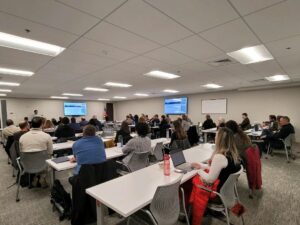Mid-Atlantic Source Water Protection Leadership Forum

The Mid-Atlantic Source Water Protection Leadership Forum was held on November 14-15 in Philadelphia, PA. The forum brought over 70 representatives together from state source water protection programs, EPA, interstate and local governments, drinking water utilities, local source water collaboratives, associations (including ASDWA), and academia. The agenda included sessions with presentations on many interrelated source water protection topics including regulatory and voluntary successes and challenges, climate change impacts, groundwater recharge, emergency preparedness and response, nonpoint source pollution control, and PFAS and emerging contaminants.
Some key highlights of the forum included information about:
- The Early Warning System that aided the Philadelphia Water Department’s response to the March 2023 Trinseo chemical spill.
- Bipartisan Infrastructure Law (BIL) funding that is available for addressing emerging contaminants, providing technical assistance, and source water protection activities.
- National Fish and Wildlife Foundation (NFWF) grant funding that is available and has been used for road salt and riparian buffer demonstration projects, and to improve drinking water supplies in the Octoraro Creek Watershed through outreach and agricultural best management practice installation.
- Water utilities in the Hampton Roads District of Virginia and Westminster, Maryland that are addressing water quantity issues with aquifer recharge and indirect potable reuse for multiple benefits.
- States and water utilities that are using GIS mapping to help prioritize actions to address the most susceptible areas to drinking water contamination from multiple sources (including PFAS discharges).
- Research on Harmful algal blooms, microplastics, and road salt, that are continuing to impact drinking water sources.
- Water utility efforts to address PFAS that are continuing to be challenging because of lab capacity issues with getting samples in a timely manner, cost of treatment and supply chain issues with carbon.
- ASDWA and state drinking water program actions and needs for assessing and addressing PFAS.
- The National Source Water Collaborative’s development of a new NPDES Comments Guide for water utilities to understand and provide input on discharge permits where contaminants (including PFAS) are impacting their drinking water supply.
A common theme that arose from the presentations on different topics was that partnerships, outreach, and community engagement are essential for building public trust, leveraging resources and funding, and implementing actions and projects that protect drinking water quality and quantity.

